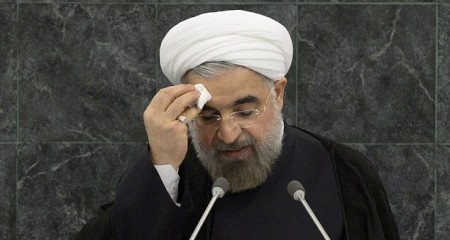Iran’s hardliners stepped up pressure this week on President Rouhani in a series of statements and warnings.
Unable to challenge Rouhani directly on the nuclear issue — because of the Supreme Leader’s support for continued discussions with the 5+1 Powers — MPs and clerics took the battle to the cultural front, criticizing the Government for its softness towards “sedition”.
The supremacy of the cultural hardline over Rouhani’s engagement with the West was demonstrated by the reaction to the visit of the European Union’s Catherine Ashton, the lead negotiator for the 5+1 Powers.
Ashton was in Tehran to prepare for Tuesday’s high-level talks in Vienna between Iran and the 5+1. However, hardliners seized on her meeting with women’s rights activists at the Austrian Embassy.
The hardliners said the event was evidence of Western support for the “sedition” of the protests after the disputed 2009 Presidential election, calling the women “criminal takfiris”. The Supreme Leader’s office joined in, with Ayatollah Khamenei’s representatives saying the Government “must answer to public opinion”.
Officials, including Speaker of Parliament Ali Larijani, also condemned United Nations Secretary Ban Ki-Moon: they said his report on human rights in Iran as “null and void, with no legal proof”.
The Government did not fight back. Instead, it pressed ahead with engagement: President Rouhani visited Oman, and reports claimed he would go to Saudi Arabia, seen as Iran’s rival in the region, in April.
On the economic front, the Supreme Leader restated his declaration of the “Resistance Economy” for recovery and triumph over Western sanctions. There was no evidence, however, of significant progress in the Government’s efforts — instead, the hardliners’ criticism appeared to inject a note of worry in the currency and financial markets, ahead of Tuesday’s nuclear talks.
FORECAST
The Rouhani Government had tried to maintain high ground against challengers such as the Revolutionary Guards and State broadcaster IRIB; however, it now appears to have barricaded itself against the attacks of the hardliners, buttressed by the Supreme Leader’s expression of concern over cultural issues.
The President’s call for press freedom, made in a speech on March 8, has receded, and there is no prospect of moves over social media, let alone more contentious issues such as political prisoners.
The worry for Rouhani is that Ayatollah Khamenei, with his endorsement of hardline attacks on the cultural front, may not continue to balance that with support for his President in nuclear talks. Any sign of tension during this week’s negotiations in Vienna could tip the Supreme Leader into criticism of the “West” that boxes in Rouhani’s engagement policy.
Similarly, the Government needs signs of economic progress to counter the mounting hardline challenge, so it can claim that Rouhani — and not his opponents — are the best managers of the Resistance Economy.
FEATURED ANALYSES
A Political Threat to Rouhani? Introducing the Endurance Front
President Rouhani’s Trip to Oman
Supreme Leader Approves Rafsanjani’s Back-Channel Talks With Saudi Arabia?

